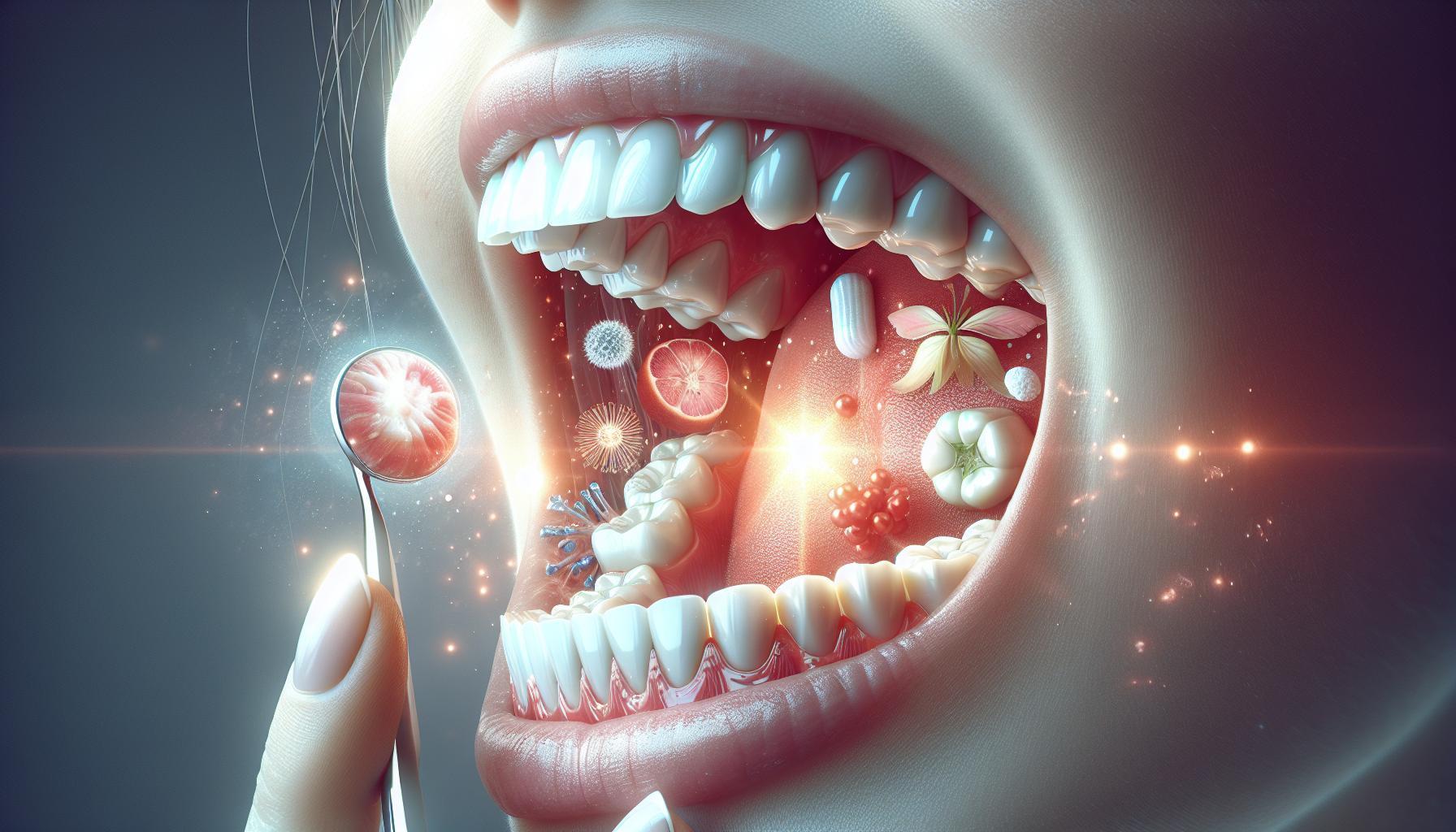Dealing with gum boils can be an uncomfortable and concerning experience, often leading to pain and swelling that disrupts daily life.Understanding how to alleviate this issue at home is crucial for rapid relief and maintaining oral health. In this article, we explore effective DIY remedies to help soothe irritation and promote healing.
Understanding Gum Boils: What They are and What Causes Them
Did you know that gum boils, frequently enough mistaken for mere dental discomfort, can signal underlying oral health issues? Recognizing what these painful swellings are and their causes can empower you to take necessary action before they escalate. Gum boils, or abscesses, manifest as localized infections that occur in the gum tissue, usually resulting from bacterial growth. They can be uncomfortable,causing both physical pain and emotional distress,especially if your unsure of their origins.
What Are Gum Boils?
Gum boils appear as small, pus-filled pockets on the gums, often accompanied by symptoms such as swelling, redness, and persistent pain. When you observe these boils, it’s essential to understand that they are typically a response to infection, frequently enough stemming from issues like:
- Periodontal disease: Advanced gum disease can lead to gum boils as bacteria infiltrate the tissue.
- Tooth infections: An untreated tooth decay or infection can progress to form a boil.
- Dental abscess: A root abscess can release pus into surrounding gum tissue, leading to boils.
- trauma: Injury to the gums or teeth can also introduce bacteria, triggering infection.
What Causes Gum Boils?
understanding the root causes can significantly help in managing and preventing future occurrences. The primary culprits behind gum boils include:
| Cause | Description |
|---|---|
| Oral Hygiene Neglect | Poor brushing and flossing habits can result in plaque buildup and gum disease. |
| Tooth Decay | Untreated cavities can lead to infections, resulting in gum boils. |
| Trapped Food | Food debris caught between teeth can foster bacterial growth. |
| Underlying Health Conditions | Conditions like diabetes can impair immune response,making infections more prone to occur. |
While seeking the right information on how to get rid of gum boils at home through DIY remedies is pivotal for immediate relief, it’s equally notable to address the underlying causes to prevent recurrence. Factors such as maintaining diligent oral hygiene, and consulting with a dental professional for ongoing issues can go a long way in preserving your gum health and avoiding the distress of painful boils. Recognizing these aspects will help you not only treat gum boils effectively but also grasp the meaning of proactive preventive care.
home Remedies for Immediate Relief: quick Fixes for Discomfort
When faced with the discomfort of gum boils, quick relief is paramount. These painful bumps are often a result of infections or inflammation and can significantly affect daily activities, making immediate action essential. Fortunately, a variety of effective home remedies can alleviate pain and promote healing, allowing you to regain comfort in no time.
Effective Home Remedies
Utilizing simple ingredients commonly found at home can yield remarkable results in managing gum boils. Here are some of the most effective remedies:
- Warm salt Water Rinse: Mixing a teaspoon of salt in a glass of warm water and rinsing your mouth several times a day can definitely help reduce inflammation and promote healing.
- baking Soda Paste: Create a paste by mixing baking soda with a little water. Applying this to the affected area can neutralize acids and reduce discomfort.
- Tea Tree Oil: Known for its natural antibacterial properties, diluting a few drops in a carrier oil and applying it directly to the boil can definitely help fight infection.
- Clove Oil: This oil is a natural anesthetic. Applying a few drops to the boil can provide pain relief, thanks to its eugenol content.
Tips for Application
When using these remedies, proper application is key. for rinses, switch the solution around gently for about 30 seconds before spitting it out. For pastes and oils, ensure your hands are clean, and apply with a cotton swab to avoid irritation. Here’s a simple table to help you track your remedy application:
| Remedy | Application Frequency |
|---|---|
| Warm Salt Water Rinse | 2-3 times a day |
| Baking Soda Paste | Once daily until relief |
| Tea Tree Oil Application | 1-2 times a day |
| Clove Oil Application | As needed for pain relief |
Additionally, staying hydrated and eating a healthy diet can support your immune system, aiding the healing process. Remember to consult with a healthcare professional if symptoms persist, as some cases may require medical intervention.
Natural Treatments to Promote Healing: Ingredients You Can Use
Gum boils can be a distressing and painful condition, often indicating underlying oral health issues. While seeking professional dental advice is essential, many people are turning to natural remedies to alleviate discomfort and promote healing. By utilizing specific ingredients found in your kitchen or local health store, you can take proactive steps toward getting rid of gum boils at home.
Natural Ingredients for Healing
The right ingredients can significantly speed up recovery from gum boils and improve oral health. Here are some potent natural treatments to integrate into your routine:
- Salt Water Rinse: A simple saltwater rinse can definitely help cleanse the affected area and reduce inflammation. Mix one teaspoon of salt in a cup of warm water and rinse your mouth several times a day.
- Tea Tree Oil: Known for its antibacterial properties, tea tree oil can be diluted in a carrier oil and applied to the gum boil to fight infection. Use twice daily to aid the healing process.
- Turmeric Paste: the active ingredient in turmeric, curcumin, has powerful anti-inflammatory effects. Create a paste by mixing turmeric powder with water and apply it directly to the gum for relief.
- Garlic: Garlic is known for its antimicrobial properties. Chewing a clove of garlic or applying garlic oil can help target the infection and promote faster healing.
- Chamomile Tea: Drinking chamomile tea or using cooled tea bags as a compress can reduce inflammation and discomfort due to its soothing properties.
How These Remedies Work
The natural remedies listed above tap into age-old practices that leverage the healing properties of common ingredients.here’s a table summarizing their key benefits:
| Ingredient | Benefits |
|---|---|
| Salt Water | Cleanses the mouth; reduces swelling |
| Tea Tree Oil | antibacterial; helps combat infection |
| Turmeric | Anti-inflammatory; promotes healing |
| Garlic | Antimicrobial; assists in fighting bacteria |
| Chamomile | Reduces inflammation; soothes pain |
Implementing these remedies can provide not just relief but also encourage your body to heal itself.Naturally,it’s important to be patient and consistent with your treatments,as some results may take time. Always consult with a healthcare professional before starting any new remedy, particularly if you have ongoing health concerns or the gum boil persists. Through a combination of proper oral hygiene and these natural treatments, you can effectively promote healing and say goodbye to gum boils.
When to Visit the Dentist: Signs You Should Seek Professional Care
Visiting the dentist may not always be top of mind, but recognizing when you need professional care can save you from more serious dental issues down the line. A gum boil, such as, can signify underlying issues that require prompt attention. While remedies for how to get rid of gum boils at home provide temporary relief,distinguishing when it’s time for a dental appointment is crucial for maintaining overall oral health.
Indicators for dentist Visits
Here are specific signs that suggest it’s time to schedule an appointment with your dentist:
- Persistent Pain: If you experience ongoing pain in your gums, especially around a boil, it may indicate infection or serious gum disease.
- Swelling and Redness: Increased swelling and discomfort that lasts more than a few days could lead to complications if not addressed.
- Foul Taste or Odor: A constant unpleasant taste or smell can be a sign of infection and may require professional cleaning or treatment.
- Difficulty Chewing: Struggling to chew or discomfort while eating should not be ignored, as it can affect your nutrition.
- Fever: If you develop a fever along with gum symptoms, it could indicate that the infection has spread, necessitating immediate dental attention.
When Home Remedies Aren’t Enough
While it’s beneficial to know how to get rid of gum boils at home through DIY remedies such as warm saltwater rinses or antibacterial gels,these methods may only alleviate symptoms without treating the root cause. If you find that these remedies are ineffective over a few days, it’s a red flag that a professional evaluation is needed.Your dentist will frequently enough conduct an examination to determine whether the gum boil is a result of an abscess, infection, or other dental issues.
Consider Your History
Your personal dental history can also guide you in deciding when to seek care. as a notable example, if you have a history of gum disease, experiencing a gum boil should prompt you to contact your dentist sooner rather than later. Similarly, individuals with diabetes or weakened immune systems are at a higher risk for complications and should take any signs seriously.being attuned to your oral symptoms is essential for maintaining a healthy mouth. While knowing how to get rid of gum boils at home can provide immediate comfort, discerning the signs that warrant a visit to your dentist is key to long-term oral health.
Maintaining Oral Hygiene: Preventing Future Gum Boils
Understanding Gum boils and Their Prevention
Gum boils, frequently enough a painful and alarming occurrence, signify an infection within the gums that can arise from neglecting oral hygiene. If you’ve ever wondered about effective ways on how to get rid of gum boils at home, it’s equally essential to focus on strategies that prevent them from developing in the first place. Maintaining good oral hygiene not only helps to reduce the risk of gum boils but also contributes to your overall dental well-being.
To protect your gums and diminish the likelihood of future infections, consider implementing the following practices:
- Regular Brushing: Brush your teeth at least twice daily with fluoride toothpaste to eliminate plaque and food particles that can lead to gum irritation.
- Daily Flossing: Floss daily to clean between the teeth where toothbrushes cannot reach, helping prevent bacteria from accumulating.
- Use Antiseptic Mouthwash: Gargling with an antiseptic mouthwash can help kill bacteria and soothe irritated gums.
- Stay Hydrated: Drink plenty of water to keep your mouth moist and encourage saliva production, which naturally helps with cleaning the mouth.
- Regular Dental Check-ups: Visit the dentist at least twice a year for professional cleanings and check-ups to catch any potential issues early.
Recognizing and Addressing Early Symptoms
Understanding the early signs of gum disease can also help you take proactive measures in preventing gum boils. Symptoms like persistent bad breath, swollen or bleeding gums, or changes in your bite can indicate underlying issues. Should you notice any of these symptoms, it’s a prompt to enhance your oral care routine or consult a dental professional.
Adding natural remedies to your routine can also provide additional benefits.For example, rinsing with warm salt water can definitely help soothe inflamed gums and promote healing. However, while these methods can help alleviate symptoms and promote recovery, they should not replace professional dental care when needed.
Food Choices Impact on Oral Health
Your diet plays a significant role in maintaining oral hygiene. A balanced diet rich in vitamins and minerals, particularly vitamin C, can strengthen gums and support healing. Avoiding excessive sugary snacks between meals is another way to minimize the risk of gum issues.
| Food types | Benefits for Oral Health |
|---|---|
| Fruits and Vegetables | High in vitamins, help cleanse teeth |
| Dairy Products | Rich in calcium, strengthen teeth |
| Lean Proteins | Support gum health and tissue repair |
| Nuts and Seeds | provide essential fatty acids and proteins |
Incorporating these daily habits and dietary choices not only enhances your oral hygiene regimen but also significantly reduces the chances of developing gum boils. By staying vigilant with your routine, you can align yourself on the path to maintaining healthy gums and teeth for years to come.
lifestyle Changes for Healthy Gums: Nutrition and Daily Habits
To maintain healthy gums and prevent issues like gum boils, it’s crucial to consider your lifestyle choices, particularly your nutrition and daily habits. These factors play a significant role in your oral health, influencing everything from inflammation levels to the body’s ability to heal. A robust understanding of how the food you eat and the habits you cultivate can lead to effective strategies in reducing gum problems and promoting overall wellness.
Nutritional strategies for Gum Health
eating a balanced diet rich in essential nutrients can significantly support gum health. Incorporate the following elements into your daily meals:
- Vitamin C: Vital for gum tissue health, vitamin C helps repair and maintain connective tissues. You can find this nutrient in citrus fruits, strawberries, bell peppers, and broccoli.
- Calcium and Vitamin D: These are crucial for maintaining strong teeth and bone structures. Dairy products, leafy greens, and fortified foods are excellent sources.
- Omega-3 Fatty Acids: Foods like fatty fish, walnuts, and flaxseeds can reduce inflammation in the body, possibly lowering your risk of periodontal diseases.
- Antioxidant-Rich Foods: Berries, nuts, and green tea are packed with antioxidants that combat oxidative stress and may help protect gums.
consider this sample table highlighting foods beneficial for gum health:
| Food | Key Nutrients | benefits for Gums |
|---|---|---|
| oranges | Vitamin C | Supports collagen,vital for gum tissue. |
| salmon | Omega-3 Fatty Acids | Helps reduce inflammation. |
| Yogurt | Calcium and Probiotics | Strengthens teeth and gums. |
Daily Habits to Enhance Gum Health
In addition to nutrition, certain daily habits can significantly impact gum health. Here are essential practices to adopt:
- Consistent Oral Hygiene: Brush your teeth at least twice daily and floss once a day to remove plaque and food particles that can lead to gum disease.
- Stay hydrated: Drinking plenty of water keeps your mouth moist and helps wash away food particles,reducing the risk of bacteria buildup.
- Avoid Tobacco Products: Smoking and other tobacco use can exacerbate gum disease and hinder healing processes.
- Regular Dental Check-ups: Schedule routine dental visits for professional cleanings and early detection of potential gum issues.
By integrating these dietary adjustments and daily habits, you can create a formidable defense against gum problems. Exploring methods for how to get rid of gum boils at home becomes easier when your foundational gum health is optimized, providing a strong backbone to any home remedy strategy. Remember, lasting change in your gum health starts with your nutrition and the habits you establish today.
DIY Oral Rinses: Simple Recipes to Soothe Inflammation
Did you know that the ingredients for soothing your gum inflammation and promoting oral health can often be found right in your kitchen? When faced with painful gum boils, a natural approach can provide relief without needing to rush to the pharmacy. These DIY oral rinses utilize simple ingredients that have been cherished for their healing properties, making them potent allies in your quest for comfort.
Homemade Oral Rinse Recipes
Let’s explore a few effective DIY oral rinses that can help alleviate inflammation and promote healing. Each recipe combines easy-to-find ingredients that work harmoniously to reduce irritation and combat bacteria.
- Saltwater Rinse
Mixing salt with warm water creates a solution that reduces swelling and draws out the pus from gum boils, offering instant relief.
- Baking Soda Rinse
Baking soda not only neutralizes acidity in the mouth but also acts as an antibacterial agent.
- Mix 1 teaspoon of baking soda in a cup of warm water and swish it around your mouth for about 30 seconds.
- Apple Cider Vinegar Rinse
Known for its antibacterial properties,apple cider vinegar is a powerful ingredient. Combine 1 tablespoon of apple cider vinegar with a cup of water for a refreshing rinse.
Benefits of DIY Oral Rinses
Using these homemade rinses regularly can not only provide immediate relief from gum boils but also contribute to long-term oral health. Here are a few benefits of incorporating these remedies into your routine:
| Rinse Type | Key Benefit | how Often to Use |
|---|---|---|
| Saltwater | Reduces inflammation and promotes healing | 2-3 times a day |
| baking soda | Neutralizes acids, freshens breath | Once a day |
| Apple Cider Vinegar | Antibacterial properties, helps balance pH | 2-3 times a week |
these rinses not only target gum boils effectively but also foster a healthier oral environment by keeping harmful bacteria at bay. By incorporating these simple remedies into your dental care routine, you empower yourself to manage discomfort and promote healing naturally.The next time you seek solutions for inflammation and pain, look no further than your home for relief!
The Importance of Stress Management: How Stress Affects Oral Health
The Role of Stress in Oral Health
Did you know that stress can have a profound impact on your oral health? When we face chronic stress, our bodies react in various ways, affecting not only our mental well-being but also the health of our gums and teeth. Studies indicate that stress can lead to a range of dental issues, including gum disease, teeth grinding, and even gum boils. This makes effective stress management crucial, especially for those seeking ways to improve their oral health or find relief from conditions like gum boils.
Chronic stress can lead to behaviors such as clenching or grinding your teeth (a condition known as bruxism), which can wear down enamel and cause discomfort. Moreover, stress hormones can negatively affect the immune system, reducing your body’s ability to fight infections, including those that lead to painful gum boils. When you are stressed,you may also be more likely to neglect your oral hygiene,a factor that can exacerbate existing dental issues or contribute to new ones.
To mitigate the impact of stress on oral health, consider practicing effective stress management techniques:
- Regular Exercise: Physical activity can help reduce tension and improve overall mood.
- Mindfulness and Meditation: These practices can lower stress levels, leading to better oral health outcomes.
- Healthy Eating: A balanced diet can support your immune system and improve oral health.
- Dental Care Routine: Maintaining a diligent dental hygiene routine can help prevent issues from worsening due to stress.
Making stress management a priority not only benefits your mental health but can also play a vital role in keeping your gums and teeth healthy. Learning how to effectively handle stress is not just essential for your day-to-day well-being; it is also a key factor in preventing discomfort from gum boils and other oral health issues.Therefore, incorporating strategies aimed at reducing stress into your lifestyle can serve as a powerful tool in your quest for a healthy mouth, especially when exploring options on how to get rid of gum boils at home.
frequently Asked Questions
How to Get Rid of Gum Boils at Home: Fast Relief with DIY Remedies?
To get rid of gum boils at home, try rinsing your mouth with warm salt water, applying a cold compress, or using herbal remedies like tea tree oil. These methods can provide fast relief and reduce discomfort. It’s essential to keep the affected area clean and avoid irritating foods.
Incorporating a natural remedy like turmeric paste or using a mouthwash containing antiseptic properties can alleviate pain and promote healing. However, if symptoms persist, it’s crucial to consult a dental professional.
What is a gum boil and why does it occur?
A gum boil is a painful swelling on the gums, often filled with pus, resulting from tooth infections or gum disease. The boil signifies that an infection is present, which requires attention.
Common causes include poor oral hygiene, trauma to the gums, or an issue with a nearby tooth. Understanding the underlying cause can guide effective treatments and help prevent recurrence. For more insights on maintaining oral health, consider exploring our dental health guide.
Can I treat gum boils at home?
Yes, you can treat gum boils at home using simple DIY remedies. Warm salt water rinses and applying a cold compress can definitely help reduce pain and swelling. However, it’s important to monitor your symptoms closely.
While home treatments can provide temporary relief, they aren’t substitutes for professional dental care. If the boil does not improve within a few days or worsens, see your dentist for further evaluation.
What home remedies are effective for gum boils?
Effective home remedies for gum boils include rinsing with salt water, applying chamomile tea bags, and using clove oil for its antiseptic properties. These methods can provide pain relief and help manage inflammation.
Additionally, maintaining good oral hygiene through regular brushing and flossing is vital to prevent future infections. Consider adding a natural antibacterial mouthwash to your routine.
How can I reduce pain from gum boils quickly?
To quickly reduce pain from gum boils,apply a cold compress or ice pack to the outside of your cheek for 15-20 minutes. Over-the-counter pain relievers like ibuprofen may also help.
Additionally, using warm salt water for rinsing can soothe pain and promote healing.If pain persists, it’s advisable to contact your dentist for professional advice.
Why does swelling occur with gum boils?
Swelling occurs with gum boils due to the body’s response to infection, leading to inflammation in the affected area. This inflammation prompts the body to send white blood cells to the site, causing redness and swelling.
Your gums might feel tender and sensitive around the boil. Addressing the infection promptly through both home treatment and professional care can help minimize swelling and discomfort.
When should I see a dentist for gum boils?
you should see a dentist for gum boils if the boil doesn’t improve within a few days, if you experience fever, or if the swelling spreads. Professional evaluation may be necessary to address any underlying infections or tooth issues.
Ignoring persistent symptoms can lead to complications, so timely intervention is vital. Early dental care can often prevent more severe problems down the line.
Future Outlook
tackling gum boils at home is a manageable endeavor with the right knowlege and DIY remedies at your fingertips.From saltwater rinses to warm compresses and herbal solutions, these approaches can provide fast relief and promote healing. Remember, while these methods can be effective, it’s critically important to listen to your body and consult a dental professional if symptoms persist or worsen. Your oral health is paramount, and taking proactive steps empowers you to address issues head-on. We encourage you to explore these remedies further and take control of your dental health.Don’t hesitate to share your experiences or seek assistance when needed—you’re not alone on this journey to recovery!








